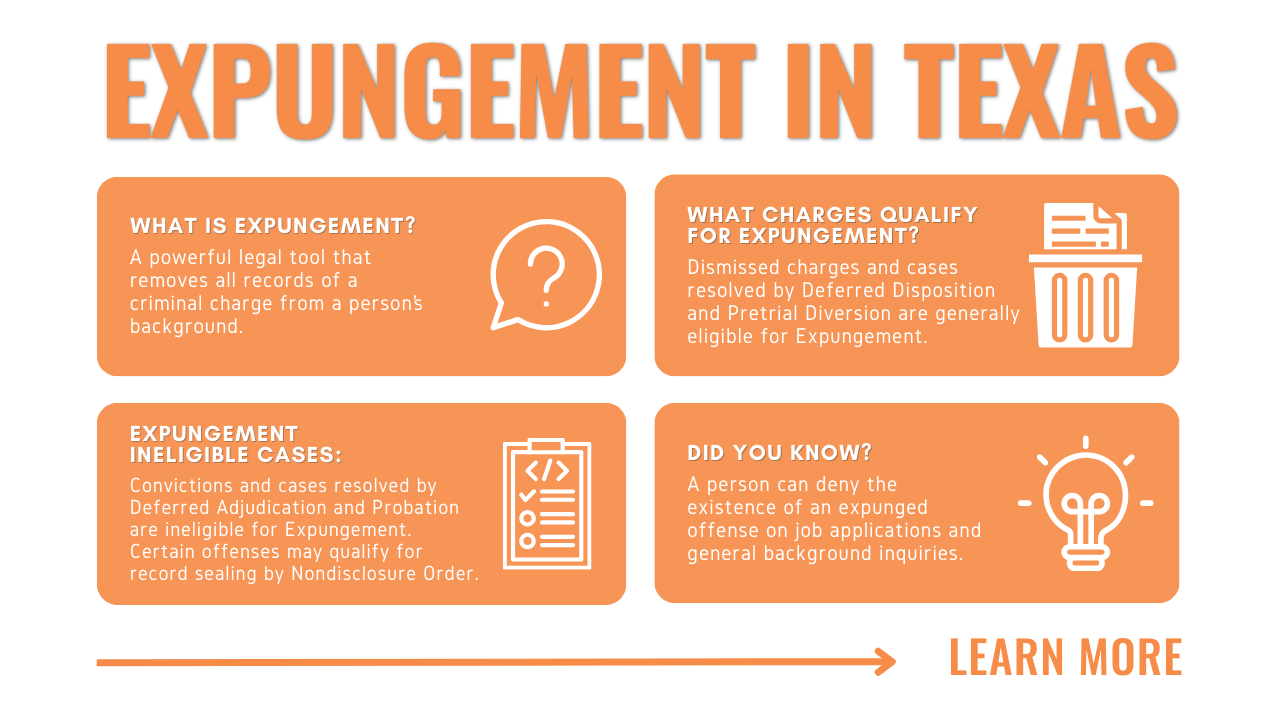Expungement in Georgetown: Clear Your Criminal Record
Criminal records in Texas have damaging consequences. The records of an arrest in and subsequent prosecution, even if the charge was eventually dismissed, can negatively impact job opportunities, student aid, loan applications, international travel, gun ownership, and much more.
The only way to delete a criminal record in Texas is through an expunction. Expunction eligibility is limited, and based on a number of factors. If a charge is not eligible for expunction, it may qualify for an order of nondisclosure, which has the effect of sealing the record.
- What is an expunction order?An expunction is a court order to delete and destroy all records of a criminal charge, including records of the arrest and subsequent prosecution. After an expunction has been ordered and effected, a person may legally deny the occurrence of the underlying incident.
- How do I get an expunction in Georgetown?Criminal charges can be expunged in a district court in Williamson county. A legal petition is drafted stating the law and legal reasoning for the expunction, as well as an order for the judge to sign.
- What is a petition for nondisclosure in Texas?A petition for order of nondisclosure is the next-best-thing to an expunction. A nondisclosure is an order to seal the records of a criminal arrest and prosecution. While the record is sealed and inaccessible to private sector entities, government agencies and law enforcement will still have access to the records.
Who Qualifies for an expunction in Texas?
Dismissed charges are expunction eligible. If a person is found not guilty and acquitted at trial the charge is also eligible. Charges dismissed after completing probation are not eligible for expunction, unless the charge was a Class C Misdemeanor.
- Can a felony be removed from your record in Georgetown?Yes. Felony charges that have been dismissed will generally be eligible for expunction.
- What crimes can be expunged in Williamson county?Any type of criminal charge can be expunged in Texas, if the details of the dismissal meet qualifying factors.
Who qualifies for a nondisclosure?
Generally, charges dismissed after completing probation through deferred adjudication are eligible to be sealed with a petition of nondisclosure. Some final convictions, like DWI, may be sealed as well. Learn more.
- Can police see expunged records in Texas?No. Police cannot see expunged records. However, law enforcement and government agencies may still access records that have been sealed through nondisclosure.
- Can deferred adjudication be taken off my record?Yes. A charge for which Deferred adjudication was granted can be expunged, if the charge was a Class C Misdemeanor.
What is the waiting period for expunction?
There is no waiting period to expunge a charge after acquittal at trial, or if the charge is dismissed after successful completion of a pre-trial or speciality court program. If a person is convicted, but later pardoned, an expunction may be immediately filed as well.
- Class C Misdemeanor – 6 months from date of offense.
- Class A or B Misdemeanor – 1 year from date of offense.
- Felonies – 3 years from the date of offense.
What if I am not eligible for an expunction?
If you are not eligible for an expunction, the next best option in Texas is an order of nondisclosure. Unlike an expunction, an order of nondisclosure is available after completing deferred adjudication and straight probation, in certain circumstances.
An order on nondisclosure prevents the law enforcement agencies, jails, court clerks, and other public information agencies in Williamson county from releasing arrest information to private third parties.
Nondisclosure eligibility follows completion of deferred adjudication if the crime did not involve sex, guns, or violence, and five years has passed.
- What felonies cannot be expunged in Texas?Expunctions and orders of nondisclosure are not available for kidnapping offenses, sex crimes, abandonment or endangerment of a child, injury to a child, the elderly or disabled, violation of a protective order, stalking or crimes involving family violence.
- How far back does a background check go?All the way. There’s no legal limit to how far back in time an employer can search a criminal record in Texas. There is also no limit on how old a prior offense can be for enhancement purposes in a subsequent prosecution.
Example: If you received a DWI conviction in Georgetown 1980, your next DWI charge will be enhanced to a DWI 2nd Offense.
- Do misdemeanors go away in Texas?No. Misdemeanor charges don’t go away, or “fall off” of a person’s criminal record. They are permanent unless expunged.
- How long does a felony Stay on record in Texas?Forever. There is no period of time after which a criminal charge or conviction is removed from the record in Texas. That is why it’s critical to expunge or seal everything that is eligible for an expunction or nondisclosure.
How Long Does Expungement Take in Texas?
Expunction – Once a petition for expunction is filed, it takes approximately six to eight weeks for the court to rule on it. If granted, the clerk of the court must then send a certified court order instructing all city, state and federal agencies to destroy all records of the incident. This can take up to six months.
Order of Nondisclosure – Once a petition for nondisclosure is filed, it takes approximately six to eight weeks for the court to rule on it. If granted, the clerk of the court must then send a certified letter to the Texas Department of Public Safety (TXDPS) indicating the existence of the Order. TXDPS then must send letters to other government agencies and repositories that might have records of the arrest. This can take up to six months.
- How much does it cost to expunge in Georgetown?The filing fees are typically hundreds of dollars. The fees in Williamson county are different from other jurisdictions across Texas. While many law firms and businesses offer discount rates for easy or cheap expunctions it is important to remember that you typically get what you pay for. Mistakes cost time and money, and can further damage one’s record.
Can you get a DWI expunged in Texas?
Yes. DWI charges that are dismissed are eligible for expunction. If you have been charged with a DWI in Georgetown, or anywhere in Texas, it’s critical to do everything possible to obtain a dismissal. A dismissed DWI charge can be deleted from the record forever. Learn more.
How to expunge a record in Texas?
The first step in clearing a criminal record in Williamson county is determining eligibility for either an expunction or nondisclosure. It is important to note that a criminal charge will not be eligible for both.
- Texas Code of Criminal Procedure, Chapter 55 governs the expunction of criminal records. This chapter outlines who is eligible for and has a right to an expunction.
- Texas Government Code, Chapter 411, Subchapter E-1 governs nondisclosure orders. In this subchapter you will find the laws that explain who is eligible for an order of nondisclosure.
- Texas Family Code, Chapter 58 governs the sealing of juvenile records. Section 58.203 also outlines what requirements must be met in order for certain juvenile records to be automatically restricted.
TREY PORTER NAMED BEST LAWYER IN CRIMINAL DEFENSE
Trey Porter is a dynamic advocate, nationally recognized for his work in DWI Defense. He has been voted by his peers as a best lawyer in the field of Criminal and DWI Defense every year since 2015. Recognized by SuperLawyers, Mr. Porter has also been distinguished as a Top 40 Under 40 Criminal Defense Lawyer by the National Trial Lawyers Association. Mr. Porter holds a Superb rating from AVVO, where attorneys are rated based on skillful litigation, client satisfaction, peer endorsements, and positive results. Learn more.
Contact Trey Porter Today
Request a free consultation
The stakes are high. Criminal charges can have devastating, lifelong consequences. During the free, confidential consultation, Mr. Porter will answer questions surrounding your legal matter, and discuss and identify potential defenses.
If you have been arrested and charged with a crime, the State is working on your conviction. It’s time to start building your defense.














